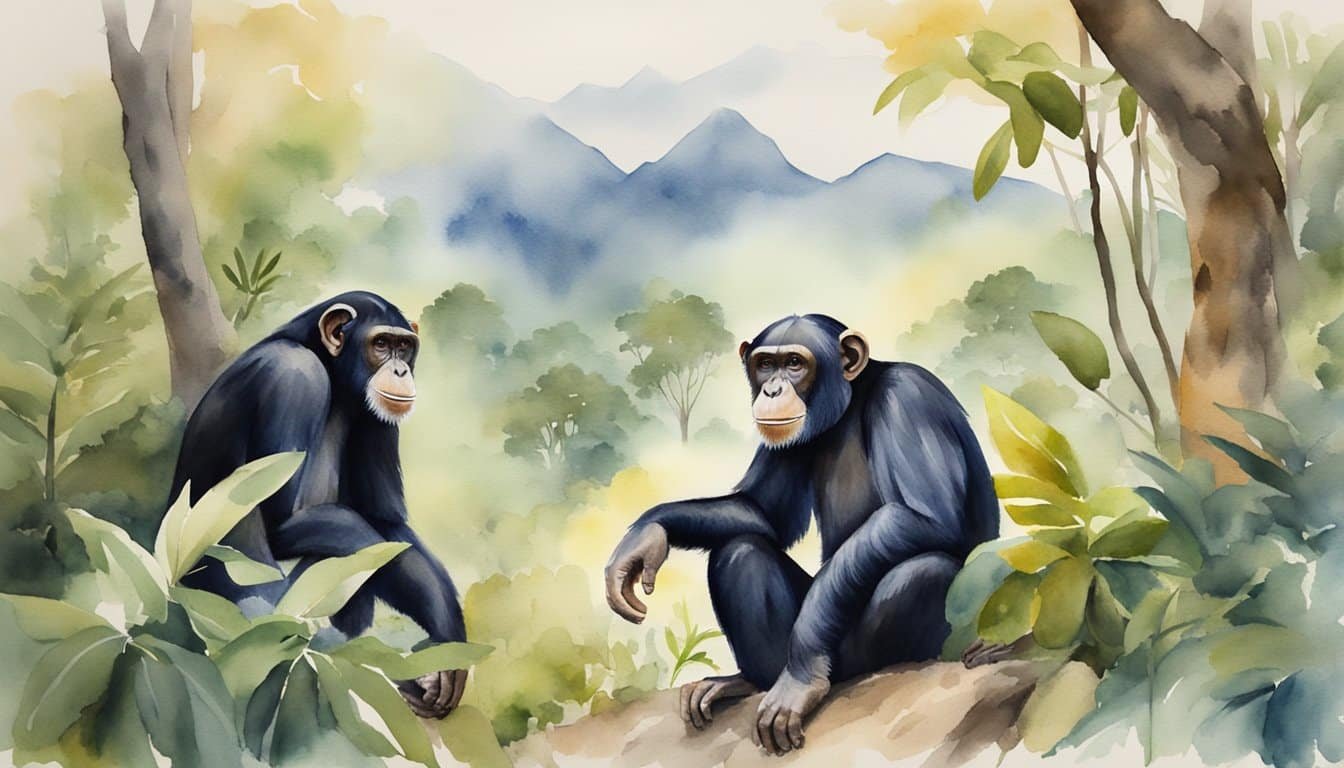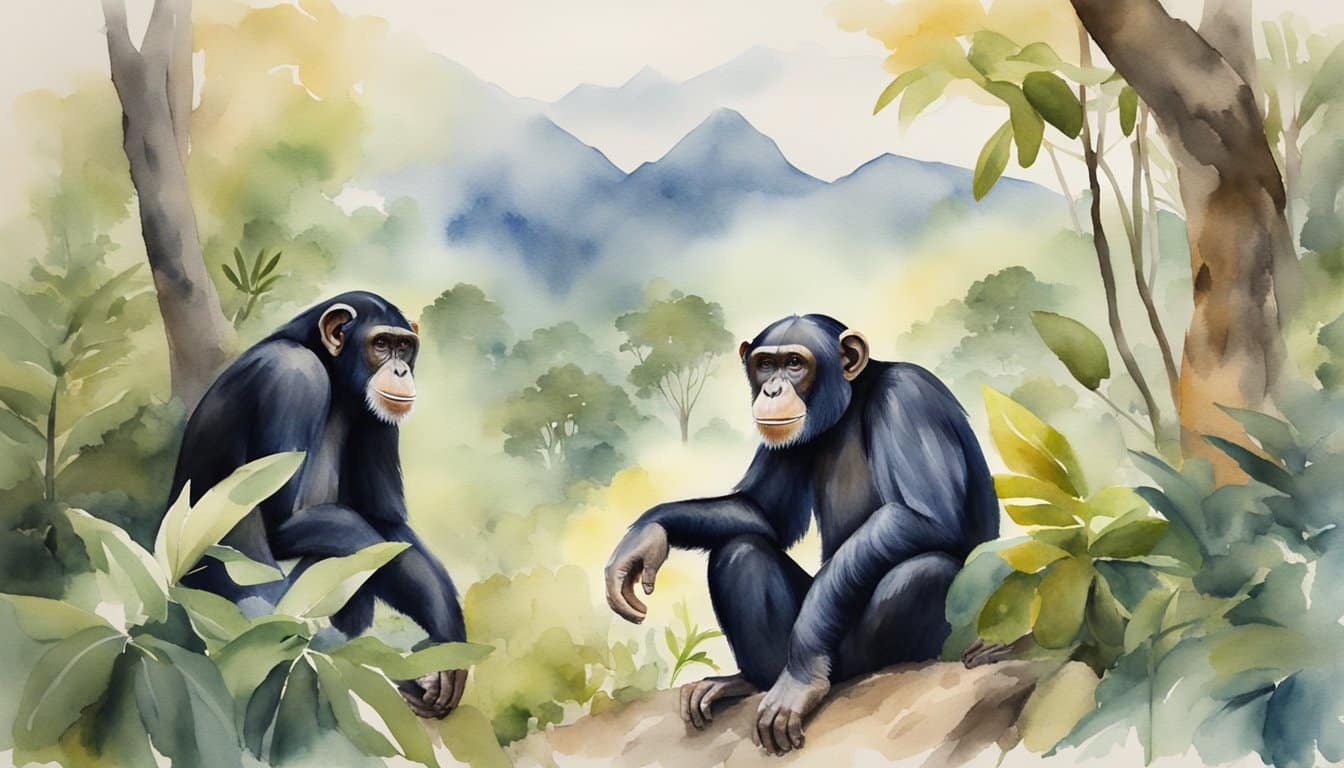Understanding Chimpanzee Intelligence
Chimpanzee intelligence reflects their remarkable cognitive abilities, from using tools to complex social interactions. Researchers continue to uncover the depth of what these animals can achieve, making Pan troglodytes a subject of ongoing fascination and study in the animal kingdom.
Cognitive Abilities and Tool Use
Chimpanzees have been observed exhibiting impressive problem-solving skills, particularly in their use of tools. In their natural habitats, they are known to craft sticks into tools to extract insects from holes or honey from beehives. Their toolmaking is not just a matter of instinct; it involves foresight and planning. For instance, studies noted contextual tool use, highlighting that these primates select tools based on the task at hand. This ability to think ahead and choose appropriate tools is a clear indicator of their intelligence.
Language and Communication
Chimpanzees are not silent spectators in their environment; they are active thinkers who utilize complex forms of communication to express themselves. Scientists have taught some chimpanzees forms of sign language, which the animals use to convey thoughts and needs. This does not merely mimic human actions but showcases an understanding of symbols and syntax. Their natural communication also includes a variety of vocalizations and gestures, underscoring a rich tapestry of social exchange.
Social Structures and Learning
Within their groups, or communities, chimpanzees embody intricate social structures that allow for the transmission of culture and learning. Primatologists have documented various community-specific behaviors suggesting a form of social learning and culture unique to each group. They also demonstrate social intelligence, understanding complex relationships and hierarchies within their communities. This sort of environmental influence extends to imitation and teaching, particularly from mother to offspring, cementing the role of social cognition in chimpanzee intelligence.
Chimpanzees in Different Environments

Chimpanzee intelligence exhibits remarkable versatility, adapting to varied habitats with distinctive tool usage. From the dense forests where they craft tools to extract termites to open woodlands where they crack nuts, adaptability is a hallmark of their species.
Wild Chimpanzees Versus Captivity
In the wild, chimpanzees display astounding behavioral complexity, using an array of tools for diverse purposes. They might fashion sticks to fish for termites or create sponges from leaves to absorb water. This resourcefulness shows a deep understanding of their environment and a problem-solving capacity. For instance, studies underline their ability to communicate under double-blind conditions, evidencing the nuanced use of signs within their communities. On the other hand, chimpanzees in captivity often exhibit different behaviors, with some displaying enhanced problem-solving skills due to the enriched environment provided by human caretakers.
The Influence of Genetics and Environment
Genetically, chimpanzees share a significant portion of their DNA with humans, accounting for some of their remarkable cognitive abilities. Specific genes have been identified that may influence the brain size and cortical thickness in these primates, correlating with intelligence metrics. These findings suggest that intelligence in chimpanzees may not solely be a product of environmental factors but also an inherent genetic propensity. Nevertheless, the environment plays a crucial role. For example, the varying availability of food sources like fruit or leaves may necessitate unique foraging behaviors and tool use, alluding to the influence of environmental pressures on evolutionary and cultural development. Such environmental factors, paired with genetics, foster a wide range of behaviors and cultural expressions across different chimpanzee communities and subspecies.
Conservation and Ethical Considerations

Chimpanzees, our closest living relatives in the animal kingdom, face numerous challenges in their fight for survival, and our understanding of their sophisticated behaviors places a significant responsibility on humans to protect them.
Survival and Protection of Species
Chimpanzees are an endangered species, and their future hinges on concerted conservation efforts. Habitat destruction, poaching, and disease have led to a dire situation for these great apes. Organizations across the globe are working tirelessly to safeguard the remaining populations. For instance, in the dense forests of Uganda, conservationists have had to balance ethical considerations with practical interventions to ensure the survival of chimpanzees. Moreover, wildlife sanctuaries, such as those in Atlanta, Georgia, provide valuable refuges where these apes can live without the threat of poachers or habitat loss.
Research and Human Responsibility
Research on chimpanzees has greatly expanded our knowledge of their complex social structures and cognitive abilities. Centres like the Yerkes National Primate Research Center in Atlanta are at the forefront of studying chimpanzee behavior. The findings from such research do more than just fill pages in academic journals; they inform conservation strategies and raise ethical questions about our use of non-human primates in experiments. It’s widely accepted that these intelligent creatures are capable of experiencing suffering, and this recognition has led to changing some of the ways chimpanzees are treated in captivity. Considering ethical and scientific concerns, the scope of animal research is being examined through a new lens, encompassing both the welfare of the individual animals and the long-term conservation of the species. Cultural factors also play a role, as seen in the innovative approaches to chimp conservation adapted in West Africa, which you can read about in the journals of National Geographic.
Discussions on social media platforms like Twitter showcase a growing public interest and concern for the well-being of our primate cousins. Even here, academic discussions merge with pop culture, revealing the multifaceted relationship humans have with chimpanzees, one that intertwines science, ethics, and the collective responsibility we bear for their preservation.

